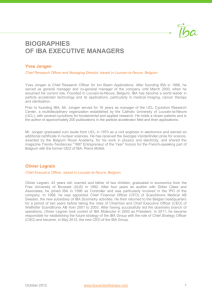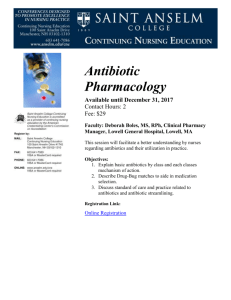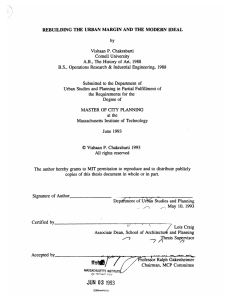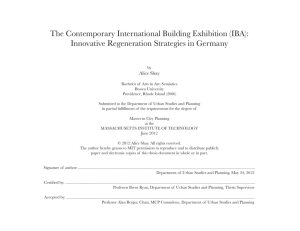Institute of Biotechnology and Antibiotics
advertisement
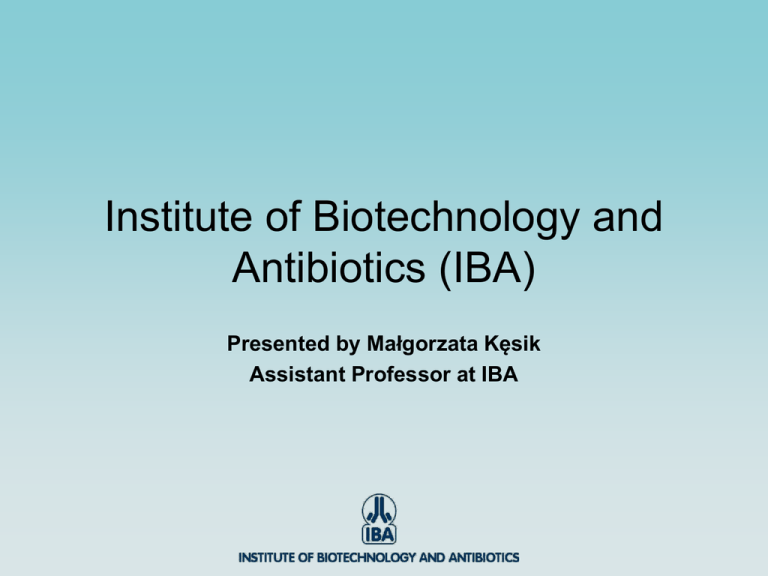
Institute of Biotechnology and Antibiotics (IBA) Presented by Małgorzata Kęsik Assistant Professor at IBA Institute of Biotechnology and Antibiotics (IBA) • Is a State research and development centre established in 1985 by the Minister of Industry. • Its activity is associated with health care and pharmaceutical industry. • Employs 125 people, including 26 scientists. The IBA Bioton Group Institute of Biotechnology and Antibiotics has been taken over and developed by Bioton. Currently IBA and Bioton forme IBA-BIOTON Group. IBA-BIOTON Group is a Polish leading pharmaceutical producer. The research work at IBA focuses on: • methods of synthesizing new antibiotics, • selection of highly effective strains of microorganisms for the production of antibiotics, • the improvement of antibiotic biosynthesis processes, • the study of mechanisms of transmitting antibiotic-resistant genes in bacteria, • development of new preparations for diagnosis based on monoclonal antibodies. The research work at IBA focuses on (2): • genetic engineering of new gene expression systems, • genome diagnostics, • manufacturing of biologically active high purity compounds with protein structure (e.g.: recombinant human insulin, growth hormone and interferon) Recombinant human insulin 2000-2005: Completion of a long-term team project on recombinant human insulin manufacturing technology. Biosynthetic human insulin solution, isophane biosynthetic human insulin and its mixtures (17 pharmaceutical forms in total) were authorised for marketing in Poland and implemented in production by the Bioton company under the Gensulin trade name. IBA manufactures three important antineoplastic medications: • Biorubina® (doxorubicin) - anthracycline antibiotic used in solid tumour therapy haemopoietic and lymphatic sarcomas and neoplasms. • Bioepicyna® (epirubicin) - anthracycline antibiotic used in various neoplasms • Biodribin® (cladribine) – deoxyadenosine nucleoside derivative, used in hairy cell leukaemia, chronic lymphocytic leukaemia and non-Hodgkin lymphoma. International cooperation Participation in international MolCoNet project, financed by the EU (coordinated by Milan University). The project is to share experiences in utilisation of logical operations with DNA. Project participants: institutes and universities from Austria, France, Spain, the Netherlands, Moldova, Rumania, Great Britain and Italy. Department of Bioengineering • • • research on plasmids, aimed at producing own high-efficiency protein expression systems, research on genome’s mobile elements and integrons in drug resistance development in bacteria, research aimed at recombinant viral antigen production and application as oral subunit vaccines Offer – Genetic Engineering • Construction of Escherichia coli working strains producing specific protein or peptide medications based on own expression or other vectors patented by IBA. • Working strain stability testing. • Strain stability or protein production enhancement by implementing genetic changes in vectors. • Periodic control of protein coding sequence in the expression vector as required by the Good Laboratory Practice principles. Offer – Genetic Engineering (2) • Development of separate analytical methods for each medicinal product, including quantitative determination of contamination with host protein, plasmid and genome DNA required by the European Medicines Agency, determination or development of the ELISA test and production of monoclonal antibodies used in the test. • Biological activity test of the protein medications in cell cultures. Offer – Genetic Engineering (3): • Development of immunological ELISA tests to determine other impurities in tested medications, e.g. residual enzymes used in production. • Orders for developing purification methods for specific proteins made by working E. coli strains with respect to limitations associated with process scale-up from beaker to industrial scale. Thank you for your attention Ph.D. Małgorzata Kęsik Institute of Biotechnology and Antibiotics kesikm@iba.waw.pl





